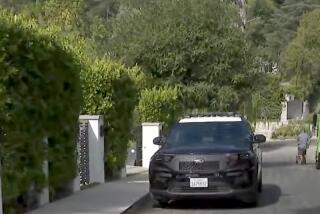Roving Police Unit Aims to Drive Dealers From Street
- Share via
Police are trying a new technique against bold drug dealers who peddle narcotics in several San Fernando Valley neighborhoods--a permanent, roving police detail designed to “make it impossible” for curb-side, drive-up sales.
Their current target: Blythe Street in Panorama City.
The sole responsibility of the newly formed unit, nicknamed NED for Narcotics Enforcement Detail, is to patrol one drug-infested neighborhood for a prolonged period until “the dealers give up and leave,” said Deputy Chief Ron Frankle, commanding officer for the Valley and Westside. The uniformed officers will be visible around the clock.
Because the detail will be permanently available to respond to neighborhood drug problems, police feel it will fill the void left when task forces are periodically assembled to crack down in a particular neighborhood, then disband only to have drug dealers trickle back to the street.
Previous task forces patrolled for only one to two weeks and concentrated on making many arrests. The new detail will stay in a given area for at least two months and concentrate on discouraging dealers and buyers from showing up in the first place. Because the detail is permanently assembled, it can quickly be returned to an area if the curb-side drug dealing flares up again.
“We do not go in on a short-term basis and then pull back out of the hot spot,” Frankle said. “Our purpose is to take back the street and get rid of the drugstore flea markets.”
Patrols Started This Week
NED officers began patrolling Blythe Street this week. Police passed out letters to residents in English and Spanish informing them that they are “committed to stay in the neighborhood” until drug dealers are gone.
Frankle would not say how many officers are assigned to the unit because he wants the patrols to appear larger than they are.
The three-block stretch of Blythe Street where police are patrolling is lined with aging three-and four-story apartments, most of them run-down and deteriorating. The street has long been one of the worst drug-trafficking and crime spots in the Valley.
Police said many of the Blythe Street drug traffickers are small-time dealers living in the neighborhood, making it difficult to drive them out.
But, said Cmdr. Ken Hickman, who oversees narcotics enforcement in the Valley, if NED merely forces the dealers to move inside apartments “that’s OK,” because the program is aimed at the street problem.
The police presence will also deter the buyers who casually drive by for curb-side drug service, police said.
Made up of specially trained narcotics officers from the five Valley stations, the detail quietly began working two months ago in the neighborhood of Columbus and Orion avenues in Sepulveda.
Like Blythe Street, the Columbus-Orion neighborhood is lined with apartments, some aging and run-down, and are known as Valley hot spots for open drug dealing.
Frankle said NED officers patrolled the neighborhood for eight weeks and made more than 160 arrests. Also, officers stop potential buyers for traffic violations.
But the real effect of the uniformed police force in marked vehicles is visual, he said.
“You can go up and down the street and see that there is a marked difference,” Frankle said. “Residents can walk on the sidewalk again.”
Dealers Hard to Find
Undercover officers have attempted to buy drugs in the neighborhood three times in the two weeks since the detail left and have been unable to find street dealers, said Sgt. Dave Rossi, who supervises the detail.
Debbie King, an Orion Avenue resident and community activist who has organized a neighborhood watch in the area, said the patrols did drive away the open drug dealing. But, she said, she fears the dealer have “gone underground.”
Although the police patrols reduce paranoia among residents, King said, “if we relax, we’ll lose sharpness for who’s who.”
“The dealers are like roaches in the dark. The minute the lights go out they all scurry out from behind the wall,” she said.
She said that, before police patrols began, it was common to see up to 10 sidewalk drug dealers per block. Now, she said, it is down to about two or three.
Frankle promised that, if dealers return to Columbus-Orion, the NED detail will be back.
“I can’t solve all of the drug problem,” he said, “but I do expect to give people back their neighborhood.”
More to Read
Sign up for Essential California
The most important California stories and recommendations in your inbox every morning.
You may occasionally receive promotional content from the Los Angeles Times.










